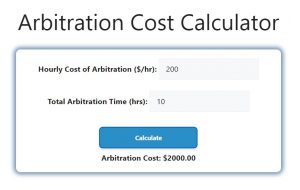About Arbitration Cost Calculator (Formula)
An Arbitration Cost Calculator is a valuable tool designed to help individuals and businesses estimate the potential costs associated with arbitration proceedings. Arbitration is often preferred over litigation due to its efficiency and confidentiality. However, understanding the costs involved is crucial for effective budgeting and financial planning. This article explores the formula used for calculating arbitration costs, how to use the calculator, and answers to common questions regarding arbitration expenses.
Formula
The formula for calculating arbitration costs is AC = HC * T. Here, AC represents the arbitration costs, HC stands for the hourly cost of the arbitrator, and T indicates the total time spent in arbitration.
How to Use
To use the Arbitration Cost Calculator, follow these simple steps:
- Determine the Hourly Cost: Find out the hourly rate of the arbitrator or arbitration service you plan to use.
- Estimate Time: Estimate the total time expected for the arbitration process, including hearings and any necessary preparation.
- Calculate: Multiply the hourly cost (HC) by the total time (T) to get the arbitration costs (AC).
- Review: Use the calculated amount to plan your budget accordingly and consider any additional fees that may arise.
Example
Suppose you have an arbitrator charging $200 per hour, and you estimate that the arbitration will take about 10 hours. Using the formula:
AC = HC * T
AC = $200 * 10
AC = $2000
In this example, the estimated arbitration costs would be $2000.

FAQs
- What is arbitration? Arbitration is a method of resolving disputes outside the court system, where an impartial third party makes a binding decision.
- Why use an Arbitration Cost Calculator? It helps individuals and businesses estimate the costs associated with arbitration, enabling better financial planning.
- Are there additional fees besides the arbitrator’s hourly rate? Yes, there can be administrative fees, travel expenses, and costs for materials or hearings.
- How accurate is the Arbitration Cost Calculator? The calculator provides an estimate based on inputs, but actual costs may vary due to unforeseen circumstances.
- What factors can affect arbitration costs? Factors include the complexity of the case, the length of hearings, and the experience of the arbitrator.
- Can I use the calculator for international arbitration? Yes, but ensure you adjust the hourly rates and estimate time according to the specific arbitration rules and practices in the relevant jurisdiction.
- Is arbitration more expensive than litigation? Generally, arbitration can be less expensive than litigation, but it varies based on the complexity and duration of the case.
- What should I consider when choosing an arbitrator? Consider the arbitrator’s experience, expertise in the subject matter, and their fee structure.
- Can the Arbitration Cost Calculator predict the final award amount? No, it only estimates the costs associated with the arbitration process, not the outcome or award.
- Is arbitration confidential? Yes, arbitration proceedings are generally confidential, unlike court cases, which are public.
- Can I negotiate the arbitrator’s fee? Yes, it is often possible to negotiate fees before engaging an arbitrator.
- What if my case takes longer than expected? You should be prepared for additional costs if the arbitration exceeds your initial time estimate.
- Do I need a lawyer for arbitration? While not required, having legal representation can help navigate the arbitration process effectively.
- What types of disputes are suitable for arbitration? Many types of disputes, including commercial, labor, and consumer issues, are suitable for arbitration.
- Is the decision made in arbitration final? Yes, arbitration decisions are generally binding and final, with limited grounds for appeal.
- What is the role of the arbitrator? The arbitrator acts as a neutral party who listens to both sides and makes a binding decision based on the evidence presented.
- How do I prepare for arbitration? Gather all relevant documents, evidence, and any witness testimonies you may need to present your case.
- Can I request a hearing in arbitration? Yes, hearings are typically part of the arbitration process, allowing both parties to present their cases.
- Are there any specific rules for arbitration? Yes, arbitration follows specific rules, often dictated by the arbitration institution or the agreement between parties.
- What happens if I don’t agree with the arbitrator’s decision? Arbitration decisions are final and typically cannot be appealed, but you may have limited options for contesting the decision in certain circumstances.
Conclusion
An Arbitration Cost Calculator is an essential tool for anyone considering arbitration as a dispute resolution method. By understanding the formula and how to use the calculator effectively, you can better anticipate your arbitration costs and plan accordingly. With the right preparation and knowledge, arbitration can be a cost-effective and efficient way to resolve disputes.
